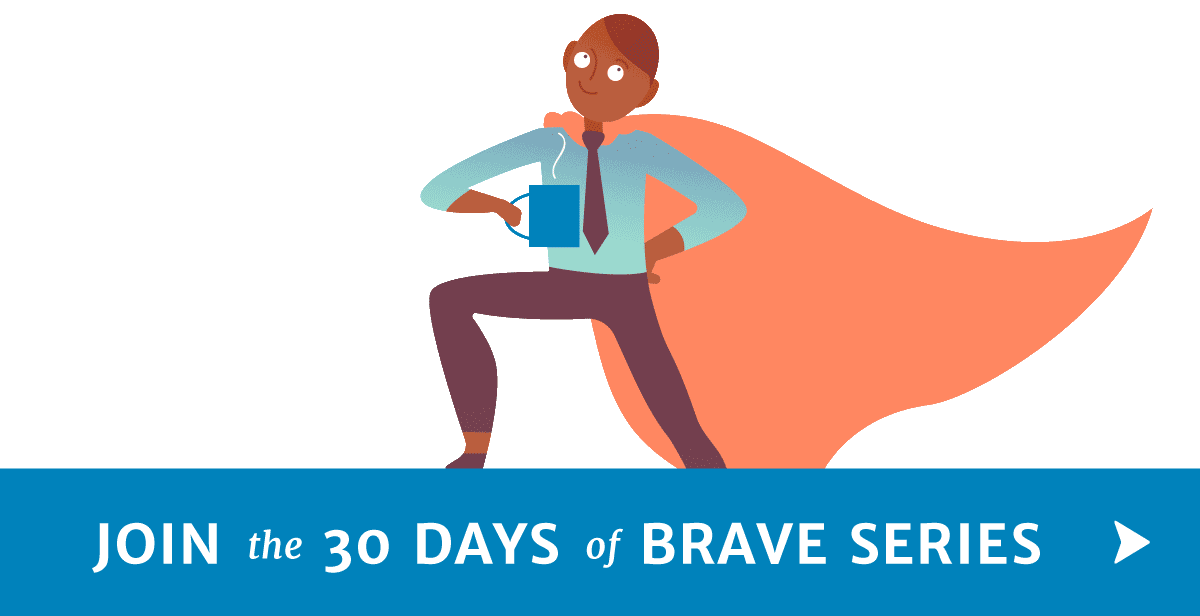How would you describe your work methods? Are you usually chasing after a job promotion or are you the type to be nervous to request a raise? Do you voice your opinions in the morning meetings or sit quietly in the back hoping not to rock the boat? If you’re the latter in both scenarios, you may not be practicing bravery at work.
Do not start panicking. While you haven’t been showing bravery yet, it is never too late to start. You may be concerned that this is too big of a feat for you to take on. Luckily, there are a plethora of small, manageable strategies that you can take up. It is important that you begin as soon as possible though, and avoid wasting any time reaching your peak success in the workplace.
You are not expected to go into work tomorrow and begin throwing your weight around, and demanding a raise. That is not bravery. Bravery is simply doing a task even when fear is present (1). This does not mean that your actions aren’t well thought out. They may just be tough for you to get the courage to make them more than fantasies in your head.
Start small to practice the skill of bravery. Eventually, you will have the courage to act in even braver ways that you had never previously considered. Eventually, you will have conquered your fears at work.
Try practicing the following five habits and begin to see positive results follow.
1. Have Confidence in Yourself
“As soon as you trust yourself, you will know how to live.”
-Johann Wolfgang von Goethe
 This is the first and possibly most important step in developing bravery at work. It is impossible to overcome fear, unless you are confident in yourself to be able to overcome any obstacles that you encounter. Try this three-part, A-B-C steps, to cultivating confidence in yourself that will power you through brave actions in the work environment (2):
This is the first and possibly most important step in developing bravery at work. It is impossible to overcome fear, unless you are confident in yourself to be able to overcome any obstacles that you encounter. Try this three-part, A-B-C steps, to cultivating confidence in yourself that will power you through brave actions in the work environment (2):
a. Banish Self-doubt
You must trust yourself that you are valuable and that your thoughts and views matter. You have a multitude of ideas run through your mind every day, and the only thing holding them back from fruition is yourself. Believe that your ideas are good. Believe that you are smart. You are. Others will line up behind you when you begin showing confidence in yourself. It is difficult to follow a leader that doubts the likelihood of their success.
b. Express Your Ideas
The first step for others to know your ideas, is for you to express them. People can’t read your mind. Explain what you are thinking so that your co-workers can understand your full vision. State your ideas with conviction. Again, it is hard for others to imagine your ideas as a good plan if you don’t seem sure about them yourself. Never feel like you shouldn’t speak up. There is a good chance that your unique perspective is a way that nobody else had considered. It may be a more efficient method or great, new product that you are suggesting. Your communication and bravery will be appreciated.
c. Defend Your Views
Once you have spoken up about your thoughts, stand by them. People may have questions, or even disagree with what you are proposing. This is where your self-confidence will come into play again. Have confidence in what you believe. This is the quickest way to show others that you have faith in the success of your ideas. This confidence will give you the leadership quality that others need to see before following.
2. Take Initiative
“It will never rain roses: when we want more roses, we must plant more roses.”
-George Eliot
Sometimes it is easy to wait for direction and have someone else tell you what to do at work. I repeat, this is the easy way- not the brave way. It makes sense to act in this way. We have been conditioned since childhood to wait to be told what to do: from parents, from teachers. However, if you want to begin experiencing positive benefits at work, it is not the way you should be acting.
This doesn’t mean that you shouldn’t listen to directions given by your superiors. Instead, if there are times that you haven’t been given directions but can see a clear solution, go ahead and act on your own. You can show initiative and save time for your company. This also gives the opportunity to exhibit confidence in your decision-making and capability at your occupation.
3. Be Open to Input
 While first instinct might tell you that going to others is a weakness, this is anything but true. It takes bravery to ask others for help and to listen to their input. However, you are able to be strong in doing this because you know that it is leader-like to acknowledge the importance of help from those around you. It is impossible for anyone to stand alone, especially in the workplace where you are meant to be acting as a team (3).
While first instinct might tell you that going to others is a weakness, this is anything but true. It takes bravery to ask others for help and to listen to their input. However, you are able to be strong in doing this because you know that it is leader-like to acknowledge the importance of help from those around you. It is impossible for anyone to stand alone, especially in the workplace where you are meant to be acting as a team (3).
When you ask others for input, they may make your ideas stronger. Others will be able to see any flaws that may stunt your idea from reaching completion. Hearing these perspectives that you haven’t considered will set you up for success. You simply must have the self-confidence and bravery to hear and accept constructive criticism.
Go ahead, ask those around you. They will look up to you for respecting their thoughts and see you as a leader rather than weak.
4. Re-evaluate the Risks Involved
“The biggest risk is not taking any risk… In a world that is changing really quickly, the only strategy that is guaranteed to fail is not taking risks.”
-Mark Zuckerberg
Another way to practice bravery in the workplace is to be realistic about the risks that are involved when trying something new at work. Typically, we imagine the worst-case scenario when we want to do something. Rather than acting bravely and going through with the action, a million excuses about what could go wrong are produced instead.
Make the effort, to be honest with yourself. Admit that you won’t get fired for asking for the promotion, or ridiculed for suggesting an idea in a meeting. In most cases, you will probably just get a no or suggestions for better luck in the future. You will be much quicker to make that brave move when you really understand that the risks aren’t as high as you originally thought.
5. View Failure Differently
“Success is not final, failure is not fatal: it is the courage to continue that counts.”
-Winston Churchill
Failure happens. It is fear that stops many from courageous work practices. Nobody likes to fail, but if you view failure differently it won’t impede your actions.
Take a different approach. If you do fail, see it as an opportunity to better yourself or to discover a new route to success. Failure is a chance to learn. Can you do something different in the future? Perhaps now you are aware of an area that you can strengthen to improve your work methods. Don’t build failure up so much in your mind that it keeps you from even trying. You may even be surprised and never encounter failure in this endeavor at all. However, you won’t know unless you attempt it.
 If you begin making these brave changes, you will soon see encouraging outcomes. This can include career progression or putting yourself in the role of a leader. In addition to others noticing your brave actions, you will feel more confident in your role at work as well. The best way to accomplish it is by focusing on it a few minutes a day. Our 30 Days of Brave Challenge will help you do just that. For just 20 cents a day you can “Unlock” your inner brave and see the changes you want to see actually start to happen in your life. It all just takes 5 minutes a day.
If you begin making these brave changes, you will soon see encouraging outcomes. This can include career progression or putting yourself in the role of a leader. In addition to others noticing your brave actions, you will feel more confident in your role at work as well. The best way to accomplish it is by focusing on it a few minutes a day. Our 30 Days of Brave Challenge will help you do just that. For just 20 cents a day you can “Unlock” your inner brave and see the changes you want to see actually start to happen in your life. It all just takes 5 minutes a day.
Make small changes, and in no time bravery will be second nature to you. Take the challenge. You'll be glad you did.
You will embody bravery in all your work-time decisions. Start your Brave Journey Now!
